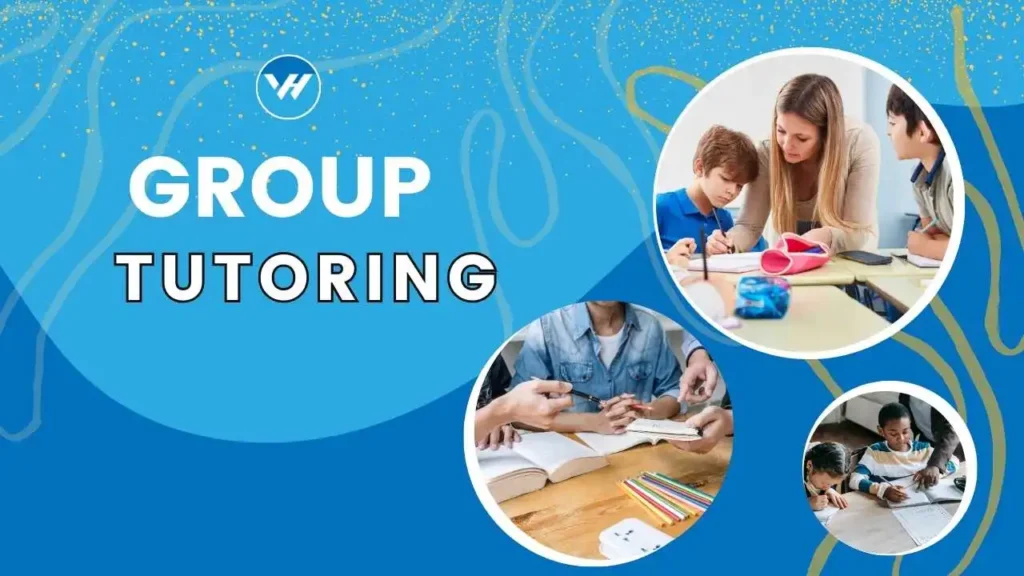
Table of Contents
ToggleIntroduction
In the realm of education, tutoring plays a crucial role in enhancing student learning and understanding. While one-on-one tutoring has its merits, group tutoring offers a unique and beneficial alternative. But what exactly is group tutoring, and how can it help students thrive? In this article, we’ll delve into the concept of group tutoring and explore eight significant benefits it offers to students.
Understanding Group Tutoring
Group tutoring involves a tutor working with multiple students simultaneously. Unlike one-on-one tutoring, where the focus is solely on an individual student, group tutoring leverages the dynamics of a group setting to foster learning. Group sizes can vary, typically ranging from three to ten students, depending on the subject and the tutor’s approach. These sessions can be conducted in person or online, catering to diverse learning needs and preferences.
How Group Tutoring Works
A typical group tutoring session is structured to balance individual attention with group activities. The tutor’s role is to facilitate discussions, guide learning activities, and ensure each student is engaged. Students interact with the tutor and each other, sharing ideas, asking questions, and collaborating on tasks. This interactive environment mimics classroom settings but with more focused attention on each student’s needs.
Benefit 1: Enhanced Learning Through Collaboration
One of the standout benefits of group tutoring is the power of collaborative learning. When students work together, they share different approaches and solutions to problems, enriching their understanding. Group activities, such as brainstorming sessions or group projects, encourage students to articulate their thoughts and learn from their peers. This collaborative environment not only enhances learning but also makes it more enjoyable.
Benefit 2: Development of Social Skills
Learning is not just about academics; it’s also about developing social skills. Group tutoring provides a platform for students to interact, communicate, and build relationships. These interactions help students develop vital communication skills, learn to work as part of a team and understand the value of cooperation. Such skills are invaluable, extending beyond the classroom into everyday life and future careers.
Benefit 3: Diverse Perspectives and Ideas
In a group setting, students are exposed to a variety of perspectives and ideas. This diversity encourages critical thinking and helps students approach problems from different angles. Hearing different viewpoints can challenge students’ assumptions and broaden their understanding of subjects. This exposure to diverse thinking processes is instrumental in developing a well-rounded intellect.
Benefit 4: Increased Motivation and Engagement
Group tutoring sessions can be more engaging than individual ones. The presence of peers creates a supportive and motivating environment. Students are often inspired by their peers’ progress and efforts, which can boost their motivation. Additionally, group activities are designed to be interactive and fun, making learning a more enjoyable experience.
Benefit 5: Cost-Effective Learning
Group tutoring is generally more affordable than one-on-one sessions. Since the cost is shared among multiple students, it becomes a more financially accessible option for many families. This cost-effectiveness allows more students to benefit from additional academic support without putting a strain on their finances. Moreover, resources and materials can be shared, further reducing costs.
Benefit 6: Building Confidence and Independence
In a group setting, students often feel more comfortable asking questions and expressing doubts, reducing the fear of judgment. This openness helps build confidence as students realize that others may have similar questions. Additionally, group tutoring encourages self-reliance as students learn to navigate group dynamics and contribute to collective problem-solving.
Benefit 7: Customizable Learning Experience
Group tutoring sessions can be tailored to meet the needs of the group. Tutors can adjust their teaching methods to suit different learning styles and paces. This flexibility ensures that each student gets the most out of the session, regardless of their individual learning preferences. Customizable sessions can address specific areas where the group needs improvement, providing targeted and effective learning experiences.
Benefit 8: Preparation for Real-World Scenarios
Group tutoring simulates real-world collaborative environments, preparing students for future professional and social situations. In many careers, teamwork and group problem-solving are essential skills. Group tutoring helps students develop these abilities early on, giving them a head start in handling real-life scenarios where collaboration is key.
Challenges and Solutions in Group Tutoring
Despite its benefits, group tutoring can present challenges, such as managing different learning paces and ensuring equal participation. However, these challenges can be addressed with effective strategies. Tutors can use differentiated instruction to cater to varied learning needs and employ techniques to ensure all students are engaged and participating actively. Regular feedback and adaptive teaching methods can help maintain a productive and inclusive group environment.
Success Stories from Group Tutoring
Numerous students have benefited from group tutoring, as evidenced by various success stories. For instance, students who struggled with math improved their grades significantly after participating in group tutoring sessions. Testimonials from both students and tutors highlight the positive impact of collaborative learning on academic performance and personal growth. These success stories underscore the effectiveness of group tutoring in fostering a supportive and enriching educational experience.
How to Find the Right Group Tutoring Program
Choosing the right group tutoring program involves considering several factors. Parents and students should look at the group size, subject focus, and the qualifications of the tutor. It’s also important to assess the teaching methods used and whether they align with the student’s learning style. Online platforms and local tutoring centers offer various group tutoring options, making it easier to find a program that fits your needs.
Conclusion
Group tutoring is a powerful educational tool that offers numerous benefits, from enhanced learning through collaboration to cost-effective solutions and real-world preparation. By leveraging the strengths of group dynamics, students can develop academically and socially, gaining skills that will serve them well beyond the classroom. If you’re considering additional academic support, group tutoring is certainly worth exploring.
FAQs
What is the ideal size for a group tutoring session?
The ideal size is typically between three to ten students, allowing for effective interaction and personalized attention.
How can group tutoring help with exam preparation?
Group tutoring provides a collaborative environment where students can share study tips, review materials together, and support each other’s learning.
What if a student feels left out in a group setting?
Tutors can employ strategies to ensure inclusivity, such as structured participation and regular check-ins with each student.
Are online group tutoring sessions effective?
Yes, online group tutoring can be highly effective, offering flexibility and access to a wide range of resources and expertise.
How can parents support their children in group tutoring?
Parents can support by encouraging participation, helping with time management, and communicating with tutors to monitor progress.





